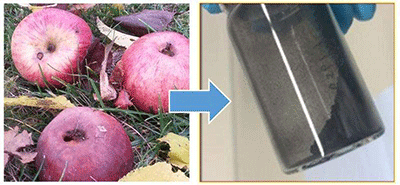
The new carbon-based material for sodium-ion batteries can be extracted from apples.
Image: KIT
The saying goes: an apple a day keeps the doctor away; but in this case, an apple may be the answer to the next generation of energy storage technology.
ECS member Stefano Passerini of the Karlsruhe Institute of Technology is leading a study to extract carbon-based materials for sodium-ion batteries from organic apple waste.
Developing batteries from waste
This new development could help reduce the costs of future energy storage systems by applying a cheap material with excellent electrochemical properties to the already promising field of sodium-ion batteries.
(MORE: Read more research by Passerini.)
Many researchers are currently looking to sodium-ion batteries as the next generation of energy storage, with the ability to outpace the conventional lithium-ion battery.
The future of sodium-ion batteries
Interest in sodium-ion batteries dates back to the 1980s, but discoveries haven’t taken off until recently. Researchers are now finding way to combat low energy densities and short life cycles through using novel materials such as apples.
(MORE: Read the full paper in ChemElectroChem.)
Sodium-ion batteries could prove to be the next big thing in large scale energy storage due to the high abundance of materials used in development and the relatively low costs involved.
This from Karlsruhe Institute of Technology:
For the negative electrode, a carbon-based material was developed, which can be produced from the leftovers of apples and possesses excellent electrochemical properties. So far, more than 1000 charge and discharge cycles of high cyclic stability and high capacity have been demonstrated. This discovery represents an important step towards the sustainable use and exploitation of resources, such as organic waste.
This research marks an important step towards the development of inexpensive and environmentally friendly sodium-ion batteries.


